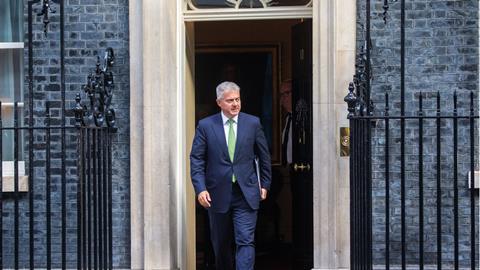New justice secretary Brandon Lewis faces a daunting inbox, ranging from legal aid to court backlogs. And after threatening to breach international law, can he win over the profession?
A public admission in 2020 that Boris Johnson’s government intended to break international law with its Brexit legislation may return to haunt barrister Brandon Lewis MP as he takes up his post at lord chancellor and justice secretary in Liz Truss’s government.
Lewis was named last week as part of a wide-ranging reshuffle which included the appointment of Michael Ellis KC MP as attorney general and Michael Tomlinson MP as solicitor general. Both are barristers.
Rachel Maclean MP, named as minister of state at the Ministry of Justice, has no legal qualification.
Lewis, 51, is MP for Great Yarmouth and a former secretary of state for Northern Ireland. He served as a junior minister in David Cameron and Theresa May’s governments. He was called to the bar by Inner Temple in 1996.
Responding to the announcements, the Law Society said the crisis in the justice system ‘should be lighting up the new justice minister’s inbox’.
‘Justice and fair play are hallmarks of Britain and traditionally a source of pride for the country,’ Society vice president Lubna Shuja said. ‘But today they are less recognisable features of our national landscape. Backlogs in the courts mean people are waiting years for their day in court, their lives in limbo. The new minister has an opportunity to re-energise the system and restore people’s faith in British justice.’
Lewis ‘should begin by making sure anyone who cannot afford legal help is eligible for state-funded expert advice – the cost-of-living crisis makes this change to the means test more urgent than ever’, Shuja said.
'Backlogs in the courts mean people are waiting years for their day in court, their lives in limbo. The new minister has an opportunity to re-energise the system and restore people’s faith in British justice'
Lubna Shuja, Law Society
Noting that civil and criminal legal aid solicitors are being forced to close their doors because government rates have been stagnant for more than two decades, Shuja urged the lord chancellor to set rates of pay ‘at the level needed to make the system viable so these vital public servants can continue to serve the country properly remunerated for their expertise and hard work’.
She concluded: ‘I look forward to working with Brandon Lewis to share our members’ insight from the frontline of justice. Solicitors see problems first-hand and early, and they can shed light on workable solutions.’
On a similar note, bar chair Mark Fenhalls KC said: ‘An open and accessible justice system that upholds the rule of law is more critical than ever. The government must commit to sufficiently funding the legal system so that the public gets the service it deserves and stop the attacks on lawyers that undermine confidence in the rule of law and the UK’s legal sector at home and abroad.
‘The most urgent problem to fix is in the criminal courts and that means barristers must be paid the same for the backlog cases as for new cases. A change at the very top of government offers a chance to find new solutions.’
Some lawyers however have been quick to recall Lewis’s admission as Northern Ireland secretary that the government was prepared to breach international law. In September 2020 Lewis said of the internal market legislation: ‘Yes, this does break international law in a very specific and limited way.’ The admission led to the resignation of the head of the Government Legal Department, Jonathan Jones.
Julian Hayes, senior partner at West London firm Berris Law, described Lewis’s appointment as ‘disappointing’. ‘Not only does he not fulfil the qualifications to hold the lord chancellor post, he strongly advocated for the government to break international law while supporting the Internal Markets Bill. It would appear that his appointment has been made principally because of his support for Liz Truss.’
However support for Lewis came from an unexpected quarter. Appearing before the House of Lords Constitution Committee, Jack Straw, the last lord chancellor in a Labour government, said Lewis ‘seems to me to fulfil the criteria laid down under the 2005 [constitutional reform] act’. As for his ‘specific and limited’ statement, Straw said: ‘I don’t think we’ve got to the point where if you’ve got previous convictions by virtue of a political stance you should be disqualified because of that fact.’
































No comments yet